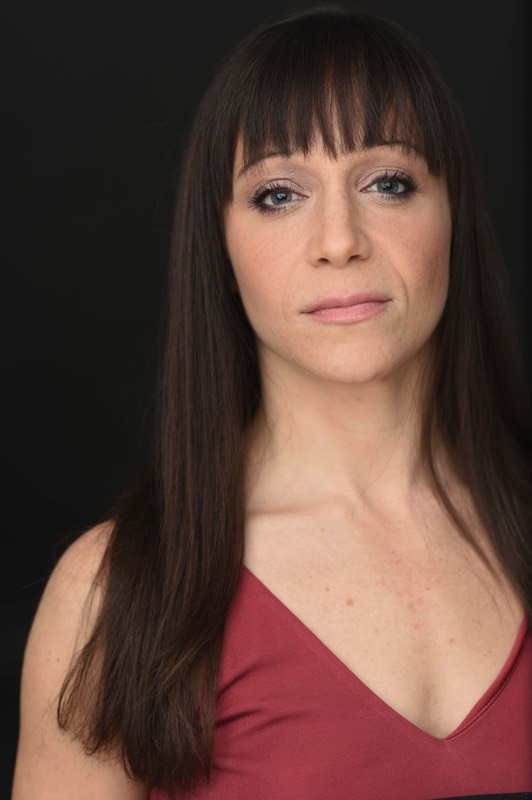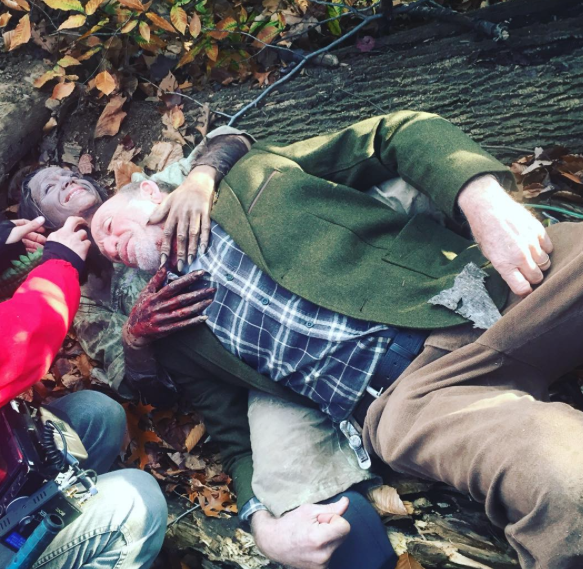INTERVIEW
Surrey’s Premier Lifestyle Magazine
A real life Lara Croft
Not many people when asked what’s their main ambition would reply: “To be set on fire”, but stuntwoman Hannah D. Scott is one. British born Hannah talks to Louise Alexander about risking life and limb for the silver screen, and how the international stunt world doesn’t get the recognition it deserves.

Based in New York, Hannah D. Scott recently landed on her feet to work as the stunt double for Bel Powley alongside Liv Tyler in Wildling, a Hollywood blockbuster released last month. Her skills and passion haven’t been reserved just for the film industry as she has also used them to help in real-life disasters.
Q Hannah, what stunts did you undertake in Wildling?
A I got to play around in this film as the character morphs into something animalistic. I worked with an attack dog, Blackjack, which was interesting as dogs lose attention and you can’t control what they do. So if the dog decides he’s bored and done, he’s bored and done. I did some high-fall work, jumping off a 30ft cliff. Oddly enough this is actually considered a low-fall in the stunt world. The rest was more gymnastic, back-bending out of trees like a harpy! It was a great team to work with: huge kudos to Manny Siverio, the stunt coordinator.
Q What’s been your most dangerous stunt?
A Every stunt holds risk, even a basic trip and fall can result in concussion. I definitely enjoy falling out of buildings and off the odd cliff. High-fall is not a favourite for everyone and there are many factors to consider. If there is a miscalculation jumping or prepping the airbags, it could be fatal. Even the weather can affect the bag itself, or perhaps when you jump, the wind comes up. Knowing when not to jump, saying ‘no’ if you don’t feel the factors are all in place, is vital.
The thing to understand is it is real. The coordinators are highly skilled professionals, they make it all happen, and take any and every measure to make things safe. Unfortunately accidents happen, but considering the amount of stunts done around the world every day, the incidents are low. Coordinators are little known to the public and they get so little thanks in many ways.
Q What stunt haven’t you done that you’d love to do?
A I’d love to be set on fire. For some reason, that’s high on my list of priorities. My poor Mum! “Mum, I’m going to get burned today.”
Q You are a stuntwoman and qualified actor, is this common?
A To find an actor who is classically trained with a stage background who is also a stunt person is certainly a rarity, and I don’t say that with ego. The two worlds are very different.
Q Why did you have to separate the two? It must be worth its weight in gold having both talents in one person?
A I really had to fight to prove myself; I had to separate the skills when applying for roles to make sure the stunt world know I am stunts, I have that hat, and vice versa in the acting world. The acting world thinks stunt performers can’t act, and the stunt world thinks actresses don’t like to hit the ground. With so many productions such as Marvel and Gotham in New York, it’s a huge benefit to be able to act and do stunts.
Q Were you sporty at school?
A Yes, I trained as a gymnast and I’ve always been throwing myself around. I focused on precision and that is a trait I still use today. My dream was to be an Olympic competitor and I trained with the British team, but a bad injury forced me to stop. I also trained in Karate and Kung-Fu.
Q How did you get into stunts?
A I was in a stage show that incorporated a lot of martial arts and one of my cast mates recommended me for a stunt role. She knew I loved martial arts and had the ability to push myself to the limit. I agreed to do it, but had no idea what I was letting myself in for. I kept in touch with a stunt coordinator and jobs kept popping up.
Q Hannah, what stunts did you undertake in Wildling?
A I got to play around in this film as the character morphs into something animalistic. I worked with an attack dog, Blackjack, which was interesting as dogs lose attention and you can’t control what they do. So if the dog decides he’s bored and done, he’s bored and done. I did some high-fall work, jumping off a 30ft cliff. Oddly enough this is actually considered a low-fall in the stunt world. The rest was more gymnastic, back-bending out of trees like a harpy! It was a great team to work with: huge kudos to Manny Siverio, the stunt coordinator.
Q What’s been your most dangerous stunt?
A Every stunt holds risk, even a basic trip and fall can result in concussion. I definitely enjoy falling out of buildings and off the odd cliff. High-fall is not a favourite for everyone and there are many factors to consider. If there is a miscalculation jumping or prepping the airbags, it could be fatal. Even the weather can affect the bag itself, or perhaps when you jump, the wind comes up. Knowing when not to jump, saying ‘no’ if you don’t feel the factors are all in place, is vital.
The thing to understand is it is real. The coordinators are highly skilled professionals, they make it all happen, and take any and every measure to make things safe. Unfortunately accidents happen, but considering the amount of stunts done around the world every day, the incidents are low. Coordinators are little known to the public and they get so little thanks in many ways.
Q What stunt haven’t you done that you’d love to do?
A I’d love to be set on fire. For some reason, that’s high on my list of priorities. My poor Mum! “Mum, I’m going to get burned today.”
Q You are a stuntwoman and qualified actor, is this common?
A To find an actor who is classically trained with a stage background who is also a stunt person is certainly a rarity, and I don’t say that with ego. The two worlds are very different.
Q Why did you have to separate the two? It must be worth its weight in gold having both talents in one person?
A I really had to fight to prove myself; I had to separate the skills when applying for roles to make sure the stunt world know I am stunts, I have that hat, and vice versa in the acting world. The acting world thinks stunt performers can’t act, and the stunt world thinks actresses don’t like to hit the ground. With so many productions such as Marvel and Gotham in New York, it’s a huge benefit to be able to act and do stunts.
Q Were you sporty at school?
A Yes, I trained as a gymnast and I’ve always been throwing myself around. I focused on precision and that is a trait I still use today. My dream was to be an Olympic competitor and I trained with the British team, but a bad injury forced me to stop. I also trained in Karate and Kung-Fu.
Q How did you get into stunts?
A I was in a stage show that incorporated a lot of martial arts and one of my cast mates recommended me for a stunt role. She knew I loved martial arts and had the ability to push myself to the limit. I agreed to do it, but had no idea what I was letting myself in for. I kept in touch with a stunt coordinator and jobs kept popping up.
Image courtesy of Hannah D. Scott

Wildling
Wildling is a Maven Pictures film starring Liv Tyler, Brad Dourif, Bel Powley and James Le Gros and was released last month. Anna (Bel Powley) has spent most of her life in the care of a mysterious man she refers to as ‘Daddy’ (Brad Dourif) who has kept her locked in the attic out of fear of a child-eating monster called the Wildling that lives in the woods. When Anna is 16, she is rescued by Sheriff Ellen Cooper (Liv Tyler) who helps Anna start her new life as a normal teenager. But as her body starts to develop, her childhood nightmares return, leading Anna to discover the secret of her true nature. The film is an interesting take on a girl facing the changes of womanhood. It is directed by Fritz Böhm and produced by Liv Tyler, Trudie Styler, Celine Rattray and Charlotte Ubben.
Wildling is a Maven Pictures film starring Liv Tyler, Brad Dourif, Bel Powley and James Le Gros and was released last month. Anna (Bel Powley) has spent most of her life in the care of a mysterious man she refers to as ‘Daddy’ (Brad Dourif) who has kept her locked in the attic out of fear of a child-eating monster called the Wildling that lives in the woods. When Anna is 16, she is rescued by Sheriff Ellen Cooper (Liv Tyler) who helps Anna start her new life as a normal teenager. But as her body starts to develop, her childhood nightmares return, leading Anna to discover the secret of her true nature. The film is an interesting take on a girl facing the changes of womanhood. It is directed by Fritz Böhm and produced by Liv Tyler, Trudie Styler, Celine Rattray and Charlotte Ubben.
Q How would you advise someone who wants to head for the bright lights?
A Don’t look for fame, that’s a fantasy and not what it’s about. It’s about the journey and the work, as clichéd as it sounds. I would say, just do it, try. Why not? It’s tough: finding work is hard anyway and if you’re in my situation you have to navigate work permits in the US.
One thing that is different to acting and a necessary for stunt performers is called ‘hustling’. This means literally walking the streets, finding out where films are being shot, meeting coordinators and reminding them that you are still around and available for business. It is accepted conduct for stunt performers, but not acting. It’s exhausting, but necessary. In the same vein, as an actor, I have been on line at 5am, doors open at 9am, waiting to sign up and hope for an audition slot. That’s pretty common here.
Q And the upside?
A I have had more opportunity to work in the US than anywhere else. It feels like things are possible and you can progress if you’re willing to put the time in. There is something so magical about New York. The artistic community here is fascinating, determined, visceral and vulnerable, hard-ass but open. I can only speak for New York, but it’s...the Yellow Brick Road. People work so hard here and just go for it: tomorrow is another day and we will find a way. It’s infectious.
Q Do you think there is more access to auditions in the UK than the US?
A Yes, but if you aren’t Equity you’re up at 4 or 5 in the morning to put your name on a list to hope there is a cancellation. There are multiple ways to submit yourself online, these platforms don’t exist in the UK as far as I know, or not to this level.
Q Have you done any theatre?
A Yes, I have done a lot off-Broadway. The Good and the True was most memorable...and terrifying. I was called in as a last minute replacement. And had to learn my lines in literally a day and a half.
Q Are you an adrenaline junkie?
A Definitely, there is a danger edge to what I do on a daily basis, but I have to say the more stunts I do there’s a hunger for the next one to be bigger and better. I push myself physically and mentally, but that’s what makes stunt people perform at their best. However, safety is first, no matter what.
Q Do you think there are enough places to train for stunt people?
A This is a point of contention, especially in New York because there is a huge lack of resources to be able to facilitate training. Los Angeles is different, Atlanta as well, probably because they have space. When I was training for Wildling one of the options was to go to Atlanta or LA, pay to stay for five days and train because there was nowhere in NY.
Q Do you think there should be more recognition for stunt people?
A Absolutely. I don’t think people realise what our job entails. There’s a campaign: #standupforstunts which asks for stunts to be a category at The Oscars and at other awards. The Stuntman’s, the Stuntwomen’s Association and Stunts Unlimited are all legendary. I would love to be considered as a member for the Stuntwomen’s Assocation. Such a huge inspiration.
Q How often do you train and what martial arts do you do?
A I have a huge passion for Jeet Kune Do: I started four years ago and train four hours a day, four to five days a week. I combine all my skills: I work JKD, but also Muay Thai, Brazilian jiu-jitsu (BJJ), boxing, SAMI Combat Systems and Kali, all components that can create ‘my’ Jeet Kune Do, what works for my body, skill set and needs. It’s gruelling, but it’s a huge part of my life.
Q Am I right in saying you are the first woman in the US to be certified in Panantukan for SAMI?
A Yes, I trained relentlessly for this, three to four hours a day. SAMI was developed in Austria by Peter Weckauf and Panantukan is the art of close-combat fighting known as ‘street boxing’ or ‘dirty boxing’ where there are no set rules. It’s an incredible system. I travelled to Austria to undertake a seven day, 10am–4pm instructor course. Out of 50 people there were three women.
Q Hannah, what’s your opinion on the #metoo campaign?
A I’m glad things are moving towards change. I’m seeing more female writers and directors, and we’re seeing stronger female roles that aren’t sexualised.
Q How are you going to transfer your skills to the next generation?
A I teach kids in my spare time when I’m not working. I help teach Jeet Kune as I know what it’s like to have a bad teacher and I don’t ever want to be a negative influence. I love it, I adore the kids. Mini ninjas!
Q Tell me how you helped during Hurricane Sandy in the US?
A Hurricane Sandy was devastating. The morning after, a friend and I walked for a couple of hours to get downtown and started by helping climb tower blocks with water supplies, taking note of anyone left behind, joining with anyone we could find.
A day or two later I joined with some locals and created hubs in the street, areas where people could either come for help or drop off supplies. It was there that I and others created a system where we could track who had help and who didn’t.
I used Facebook mostly. I would search anything to do with the hurricane and blast all the pages asking for help. I left my email address and phone number anywhere and everywhere, either for people who needed help or who could help. When I was on the ferry or trains, I pretty much demanded help, rallying people to create teams for rescue.
Over the days, we began to connect with other like-minded groups and created an app: a lady called Taylor Swope spearheaded that which became a not-for-profit organisation, Yellow Boots, now Boots on The Ground. We actually saved lives physically and mentally.
Q You must have been utterly emotionally and physically drained?
A I was, and financially. I did it for almost a year as a volunteer. The Red Cross actually told me to stop what I was doing as I was working relentlessly and making myself sick.
Q What’s the future for Hannah D. Scott?
A I know the US, New York, is my home and I would love to write and produce my own work. I’m sure I’ll be getting hit and slammed in the near future though...I hope so!
A Don’t look for fame, that’s a fantasy and not what it’s about. It’s about the journey and the work, as clichéd as it sounds. I would say, just do it, try. Why not? It’s tough: finding work is hard anyway and if you’re in my situation you have to navigate work permits in the US.
One thing that is different to acting and a necessary for stunt performers is called ‘hustling’. This means literally walking the streets, finding out where films are being shot, meeting coordinators and reminding them that you are still around and available for business. It is accepted conduct for stunt performers, but not acting. It’s exhausting, but necessary. In the same vein, as an actor, I have been on line at 5am, doors open at 9am, waiting to sign up and hope for an audition slot. That’s pretty common here.
Q And the upside?
A I have had more opportunity to work in the US than anywhere else. It feels like things are possible and you can progress if you’re willing to put the time in. There is something so magical about New York. The artistic community here is fascinating, determined, visceral and vulnerable, hard-ass but open. I can only speak for New York, but it’s...the Yellow Brick Road. People work so hard here and just go for it: tomorrow is another day and we will find a way. It’s infectious.
Q Do you think there is more access to auditions in the UK than the US?
A Yes, but if you aren’t Equity you’re up at 4 or 5 in the morning to put your name on a list to hope there is a cancellation. There are multiple ways to submit yourself online, these platforms don’t exist in the UK as far as I know, or not to this level.
Q Have you done any theatre?
A Yes, I have done a lot off-Broadway. The Good and the True was most memorable...and terrifying. I was called in as a last minute replacement. And had to learn my lines in literally a day and a half.
Q Are you an adrenaline junkie?
A Definitely, there is a danger edge to what I do on a daily basis, but I have to say the more stunts I do there’s a hunger for the next one to be bigger and better. I push myself physically and mentally, but that’s what makes stunt people perform at their best. However, safety is first, no matter what.
Q Do you think there are enough places to train for stunt people?
A This is a point of contention, especially in New York because there is a huge lack of resources to be able to facilitate training. Los Angeles is different, Atlanta as well, probably because they have space. When I was training for Wildling one of the options was to go to Atlanta or LA, pay to stay for five days and train because there was nowhere in NY.
Q Do you think there should be more recognition for stunt people?
A Absolutely. I don’t think people realise what our job entails. There’s a campaign: #standupforstunts which asks for stunts to be a category at The Oscars and at other awards. The Stuntman’s, the Stuntwomen’s Association and Stunts Unlimited are all legendary. I would love to be considered as a member for the Stuntwomen’s Assocation. Such a huge inspiration.
Q How often do you train and what martial arts do you do?
A I have a huge passion for Jeet Kune Do: I started four years ago and train four hours a day, four to five days a week. I combine all my skills: I work JKD, but also Muay Thai, Brazilian jiu-jitsu (BJJ), boxing, SAMI Combat Systems and Kali, all components that can create ‘my’ Jeet Kune Do, what works for my body, skill set and needs. It’s gruelling, but it’s a huge part of my life.
Q Am I right in saying you are the first woman in the US to be certified in Panantukan for SAMI?
A Yes, I trained relentlessly for this, three to four hours a day. SAMI was developed in Austria by Peter Weckauf and Panantukan is the art of close-combat fighting known as ‘street boxing’ or ‘dirty boxing’ where there are no set rules. It’s an incredible system. I travelled to Austria to undertake a seven day, 10am–4pm instructor course. Out of 50 people there were three women.
Q Hannah, what’s your opinion on the #metoo campaign?
A I’m glad things are moving towards change. I’m seeing more female writers and directors, and we’re seeing stronger female roles that aren’t sexualised.
Q How are you going to transfer your skills to the next generation?
A I teach kids in my spare time when I’m not working. I help teach Jeet Kune as I know what it’s like to have a bad teacher and I don’t ever want to be a negative influence. I love it, I adore the kids. Mini ninjas!
Q Tell me how you helped during Hurricane Sandy in the US?
A Hurricane Sandy was devastating. The morning after, a friend and I walked for a couple of hours to get downtown and started by helping climb tower blocks with water supplies, taking note of anyone left behind, joining with anyone we could find.
A day or two later I joined with some locals and created hubs in the street, areas where people could either come for help or drop off supplies. It was there that I and others created a system where we could track who had help and who didn’t.
I used Facebook mostly. I would search anything to do with the hurricane and blast all the pages asking for help. I left my email address and phone number anywhere and everywhere, either for people who needed help or who could help. When I was on the ferry or trains, I pretty much demanded help, rallying people to create teams for rescue.
Over the days, we began to connect with other like-minded groups and created an app: a lady called Taylor Swope spearheaded that which became a not-for-profit organisation, Yellow Boots, now Boots on The Ground. We actually saved lives physically and mentally.
Q You must have been utterly emotionally and physically drained?
A I was, and financially. I did it for almost a year as a volunteer. The Red Cross actually told me to stop what I was doing as I was working relentlessly and making myself sick.
Q What’s the future for Hannah D. Scott?
A I know the US, New York, is my home and I would love to write and produce my own work. I’m sure I’ll be getting hit and slammed in the near future though...I hope so!
Hannah as Sorel in Hay Fever by Noel Coward, Theatre Workshop of Nantucket

Profile: Hannah D. Scott
Hannah D. Scott, 37, was born and grew up in Luton, studying at the Bedford High School and later Harlington Upper. She’s proud of her UK roots and returns as often as she can. Hannah left home at 18 to study at The Royal Central School of Speech and Drama in London and she has travelled the world, stopping off in her beloved Australia for a while, and is now based in New York. She recently worked on Orange is the New Black, Blindspot and The Good Cop staring Josh Groban and Tony Danza, directed by British director, Alex Hardcastle.
Hannah D. Scott, 37, was born and grew up in Luton, studying at the Bedford High School and later Harlington Upper. She’s proud of her UK roots and returns as often as she can. Hannah left home at 18 to study at The Royal Central School of Speech and Drama in London and she has travelled the world, stopping off in her beloved Australia for a while, and is now based in New York. She recently worked on Orange is the New Black, Blindspot and The Good Cop staring Josh Groban and Tony Danza, directed by British director, Alex Hardcastle.
“I teach kids in my spare time when I’m not working. I help teach Jeet Kune as I know what it’s like to have a bad teacher and I don’t ever want to be a negative influence. I love it, I adore the kids. Mini ninjas!”
Hannah D. Scott

